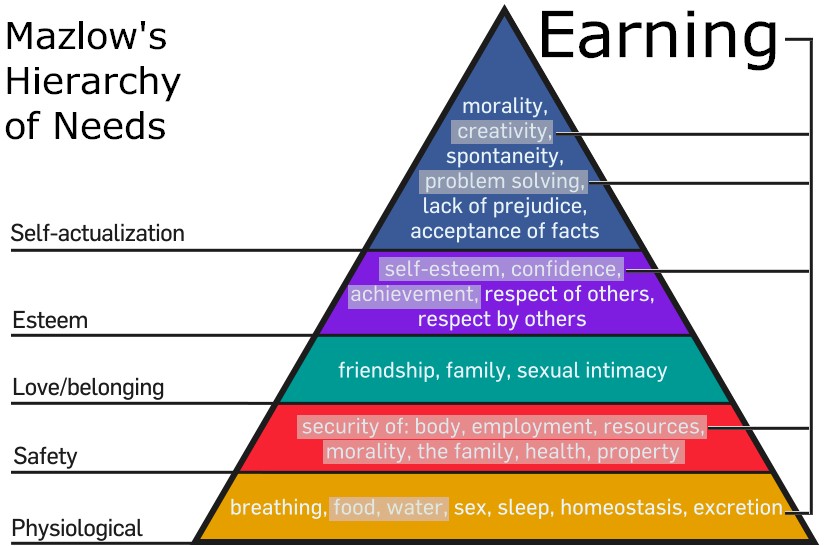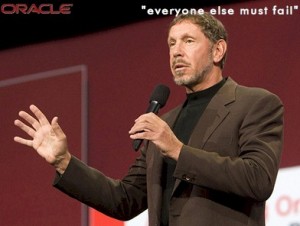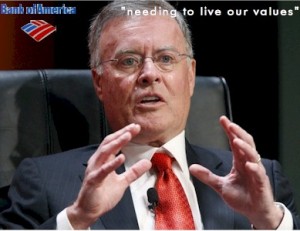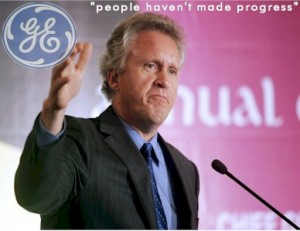Press
|
Reinventing The Compensation Wheel: Frustrated That Some People Make More Than You?
Julia Moulden | Huffington Post | September 12, 2009 | Read More »
|
|
A Response to “Would You Share Your Income With Your Influencers?”
Tom Foremski | ZDNet | July 24, 2009 | Read More »
|
Happy Earner (Labor) Day
Childbirth is classic labor. It’s painful, arduous, sweaty and miraculous. Most of us don’t consider ourselves laborers anymore, and for those that still do, the thinking to laboring ratio keeps going up. We owe a great debt to the laborers of the past who brought Labor Day to the US 115 years ago, during a time when child labor and 7 days per week, 12 hour work days were standard through out the industrialized world. They changed the norms such that we now expect kids to be educated, rather than made to work, and we believe weekends off and retirement are normal. CEOs and everyone else have benefited from their efforts.
What’s different today is “how” we work. There are easily 100 times as many kinds of jobs today as there were in the 1890s when Labor Day began. The “how” defies broad classification. But, the “why”, does not. Whether CEOs, or janitors, we’re Homo Economicus. We work to earn to live.
Earning unites us. Renaming Labor Day as Earner Day places the emphasis squarely, where it belongs, on the need to earn, not the means (laboring).
You may remember Mazlow’s hierarchy of needs from Psych 101. Mazlow studied the lives of Albert Einstein, and other greats to arrive at a hierarchy of human needs. Needs at the bottom of the triangle must be satisfied before needs at the top can be. What’s curious is to notice that about 50% of what we need derives directly from earning. It’s fundamental. One wonders how the world might change if we put one tenth as much systematic effort into distributing earning, as we now invest elsewhere. Would the need for prisons and war be reduced?
Have a happy Earner Day, and a good Earner Year!
Polivation
August 25, 2009 by Openyear
Filed under Sharing Economy
If you don’t know who Robert Shiller is, you should. He’s the Yale economist who predicted both the dot com bubble and the housing bubble that has brought on the current financial crisis. He’s someone we should listen to. His latest book, Animal Spirits, co-authored with Nobel economist, George Akerlof, as usual, lights the way. In it, they argue that capitalism works better when we acknowledge and account for human behavior, rather than having blind faith in the “rationality” of markets.
So, what does Robert Shiller see as our greatest problem today?
In conversation with Charlie Rose he said, “The biggest problem facing this country (US) is not the (financial) crisis, but the growing inequality”. Further adding, “Inequality is worse than we thought because people who are poor will die younger.” You can hear Robert Shiller speaking with Openyear here.
Robert Shiller and Leonard Burman offer a public policy solution to inequality they call The Rising Tide Tax System. Their key idea is that the tax rate on super earners should automatically rise as inequality rises. We thought we might compare it to our influence based approach, Open Pay, to see how they may complement each other.
| Category | Rising Tide Tax System (RTTS) |
Open Pay |
| Scope | USA |
Global |
| Control | Centralized (US Federal Government) |
Distributed (individuals, organizations, Openyear) |
| Mode |
Coercive (penalties for non-compliance) |
Volitional (positive social rating for participation) |
| Dependency |
Indirect – US Congress & President |
Direct – Individuals and Organizations opting in |
| % Contributed by Super Earners |
Absolute – Driven by Inequality Index |
Relative & Situational – Driven by Earners & Reputation |
| Cents on the Dollar Reaching Public |
$0.23 | $0.91 |
| Directly Benefits People Not Working |
Yes | No (not initially, but aim is to benefit some unemployed in mid-term) |
| Directly Improves Productivity | No | Yes (merit based) |
We calculate “Cents on the Dollar Reaching Public” as follows: According to the Tax Foundation, $0.23 of every tax dollar collected is consumed in compliance costs. Of the remaining $0.77, according to War Resistor’s League, 70% of every tax dollar is spent on non-human resource categories (excluding social security). This nets to $0.23 of each tax dollar directly reaching the public through social spending – actually it’s significantly less if we subtract administrations costs. This compares against $0.91 of each Open Pay dollar reaching earners.
So, Open Pay is roughly 4 times more efficient than the RTTS in terms of its impact on inequality. Or, in other words, the recommended minimum 3% super earner contribution to Open Pay is equivalent to 12% under RTTS . RTTS has the great advantage that it benefits people who can not earn, and can be used to fund large scale projects that benefit everyone, rather than simply putting more money in more hands as Open Pay will. Both have their role.
The RTTS got us thinking about the possibility of social business integrations with the US tax code, as happens, say, today with energy industry tax credits. More polivation, public policy and entrepreneurial innovation, working together, like bees and flowers, will probably be needed to boost the harvest.
How to get your boss to open his pay.
People have been asking us for an easy way to break the ice with their bosses about sharing a % of their pay. If your boss is like most, he may not get it right away. No worries. We’ve noticed earners get it quickly, but sometimes super earners take longer. To help him get up to speed; first, take 1 minute to sign up at right – because your boss will probably only do it if people around him are – then, hang this poster up in your cubicle, or some place where he’ll see it. If he asks, “Why would I want to do this?”, smile and say “Because it’s good to share!“, and send him to this link.
If you earn more than $325K in the US, you’re among the top 1% of earners, what we call, a super earner. As a group, super earners take home 23.5 % of all pay , up from 9% 30 years ago. Many of your fellow earners, those in the bottom 99%, think you should share some of your pay.
Openyear recommends a minimum 3% contribution of your pay (Open Pay). A portion of which will go directly to any earner who influences you, the rest will be added to Openyear revenues to provide all earners with a small % of their pay that they will use to reward other earners who influence them. Here’s why you should do it.
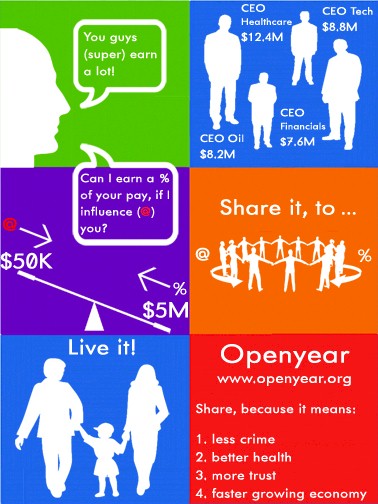 1. Get a social responsibility rating (like a credit rating), which makes your reputation for “walking the talk” of fair play real. This means better morale inside your business, and an easier time recruiting and keeping talent, resulting in a more competitive organization.
1. Get a social responsibility rating (like a credit rating), which makes your reputation for “walking the talk” of fair play real. This means better morale inside your business, and an easier time recruiting and keeping talent, resulting in a more competitive organization.
2. Get help with your agenda. There’s more smart people outside your company than inside your company. People are more likely to help when they know they’re guaranteed to be paid should they influence you, or any other super earner.
3. Build a faster growing economy. More money in more hands creates markets. People in the bottom 99% can better afford to buy what you’re selling.
4. Reduce violence and criminality. What’s peace of mind worth? In other countries with higher inequality than the US, the rich need bodyguards, armored cars and super secure homes.
5. Put your charitable dollars to, arguably, its most effective use, as inequality touches on so many different problems, from childhood well being and life expectancy to the strength of democracies.
He earned $556M in 2008. Should Oracle CEO, Larry Ellison, share his wealth?
July 24, 2009 by Openyear
Filed under Super Earners
Send Larry a message. Take the 2 minute survey.

He earned $12.5M in 2008. Should Bank of America CEO, Ken Lewis, share his wealth?
July 24, 2009 by Openyear
Filed under Super Earners
Send Ken a message. Take the 2 minute survey.

He earned $5.4M in 2009. Should GE CEO, Jeff Immelt, share more of his wealth?
July 24, 2009 by Openyear
Filed under Super Earners
Send Jeff a message. Take the 2 minute survey.

He earned $5.5M in 2009. Should US President, Barack Obama, share more of his wealth?
July 24, 2009 by Openyear
Filed under Super Earners
Send Barack a message. Take the 2 minute survey.
The Selflessness Signal
May 31, 2009 by Openyear
Filed under Sharing Economy
2006 Nobel Peace Prize winner Muhammad Yunus speaks with Bill Maher about normalcy. Bill points out that the old normalcy was to consume more than we earned to keep the economy going.
Muhammad adds that exorbitant Pay Day lending, pawn shops and check cashing companies are examples of a twisted, rather than “normal” economy. He calls for a new normalcy built on social businesses that recognize the selflesness of human beings and their desire to create positive change.
The crowd applauds. Maher suggests that they applaud because they decry selfishness, not that they’re necessarily agreeing with Muhammad. Muhammad insists they agree because he gets the “signal”. The crowd applauds louder!
They feel it. MBAs at Harvard are feeling it. The Selflessness Signal is rising.
Check out the video below, and let us know if you’re feeling it too?
‘It’s good to share’ Video
May 11, 2009 by Openyear
Filed under Sharing Economy, Earner Video
Do you care about the world? Are better health, reduced violence, more trust, improved child well being, and a faster growing economy important to you? Well, it turns out that all of these are related to the level of wealth sharing. Countries with higher levels of equality do better in all these areas (and others). Countries with lower levels of equality do worse.
So, for example, an economy is slowed when money must be spent on protection – armored cars, body guards etc. – as happens in highly unequal countries, like Brazil and Mexico. Whereas, in countries that share wealth better, like Japan and Sweden, this money is put to more productive use.
When a cruise ship is sinking, it begins to list to one side, the furniture slides, the engine may fail, the passengers may panic and become abusive. Time and effort to address each of these problems will yield results. But, fixing the leak and pumping out the excess water is the best use of the crew’s time, as it helps resolve all the other problems.
Wealth sharing is like fixing the leak and pumping out the excess water on a sinking ship. This may be the single best thing we can do to help ourselves and the world at the same time. If you doubt this, consider that the financial crisis is the result of millions of people doing the worst deals around closed credit products, where known downstream implications of a purchase, like wealth destruction and exacerbating inequality, were intentionally obfuscated.
By contrast, open products like organic foods, hybrid cars, and renewable energy, come with more information on downstream sustainability. Open products empower us to be the change we want to see in the world through the informed choices we make. If you want change, why not maximize your impact by joining with all the other people who’ve agreed to share wealth by opening their pay? By the way, it turns out that countries who share wealth better even recycle more – just in case you needed one more reason. Take a moment to check out our video, and tell a friend all the reasons why it’s good to share.



